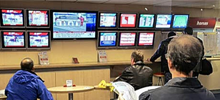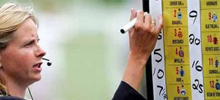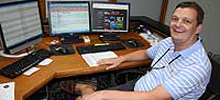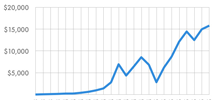Organization of a bookmaker. Definition of a bookmaker. Odds calculation and bets analysis
Definition of a bookmaker

A bookmaker is a company mainly engaged in giving the possibility to make money bets on outcomes of sports events, participation in these bets and paying out of winnings in case outcomes are not in bookmaker’s favor. Events that bets are made on can be not only sports ones but also political, cultural, etc. Totesports is also a widely know but obsolete name for a bookmaker. A mechanical device of a calculator showing the number of bets made on each horse in a definite round and the total money amount was called totesports in the past. Such totesports were naturally installed on hippodromes, and bets on horse races were taken.
The organization of bookmakers

The bookmakers always use the mathematics in their operation, especially its following sections: combinatorial analysis, probability theory and statistics. The main task of the bookmakers is to resolve the following main task – to correctly build betting odds. The betting odds are a number of sports events and their possible outcomes each having its own odds. “To correctly build betting odds” for a bookmaker means to correctly evaluate the chances of each outcome and offer the odds bringing profits to the bookmaker. It’s not easy to ensure such a balance. It’s a difficult task with hundreds of specialists working with it. Smaller bookmakers look at odds of larger competitors and only introduce small changes. The smaller a bookmaker, the smaller odds it offers, since the expenses of small business are higher compared to their profits, and thus the margin must be higher. We will talk later about the bookmaker margin.
The probability of any outcome is from 0 to 100% or from 0 to 1. Every event can have several outcomes. For example a football match has the following outcomes: the first team victory, the second team victory or a tie. Every outcome has its probability. The sum of all probabilities of outcomes is always 100%. Bookmaker specialists must estimate the probabilities of each outcome as good as possible.
- Bookmakers use the following for probabilities estimation:
- statistics of the previous games of the teams
- list of players with traumas
- motivation of a team and its players
- relations inside a team and between separate players and their coach
- situation around prospective transfers of players to other teams and expectations of new comers influencing the team spirit
- teams tasks for the tournament that includs the game in question
- country, city, stadium hosting a match (and thus the time of the flight, aggressiveness of fans and level of support, field cover, etc.)
- loyalty of umpires appointed for a match
- the weather forecast for a match
- and numerous other factors.

Having made such a deep analysis, a bookmaker specialist calculates probabilities for each outcome of a sports event. Then he transfers the values to the range from 0 to 1 (50%=0.5, 30%=0.3, 7%=0.07). Afterwards, the one is divided by the probabilities coming to odds. For example, the odds for 50% is: 1/0.5 = 2.0, for 30%: 1/0.3 = 3.33, for 7%: 1/0.07 = 14.29. The calculated odds adjust the chances of the events outcomes. If the chances were defined right, it is absolutely not important on what event bets will be made. It is explained by the fact that if a lot of similar matches are to be played, the outcomes will be distributed evenly: the first team will win in every second match, the tie will be in 3 matches of 10, and the second team will win only 7 times of 100. If odds are calculated correctly, the amount of winnings will never exceed the amount of money betted on all outcomes of one event. One exception is when a large sum is bet on one outcome and so called money disbalance in the odds occurs. Professional betters always notice the situations when betting odds change closer to the match beginning MarjoSport.net. It is explained by the fact the bookmaker corrects the betting odds because much more money was bet on one outcome compared to the opposite one, while the bookmaker needs an even distribution. In this case they attract gamblers with high odds for the outcomes nobody wants to bet on. At the same time, small odds for the outcome, which a large amount of money has been already put on, hold those who would otherwise bet on.
There is the only method to beat the bookmaker, specifically to carry out one’s own analysis of the sporting events and identify the events with wrong probabilities. These are people who work in the bookmakers and they obviously make mistakes. Such mistakes are not apparent at the first glance, so they can be found in consequence of thorough analysis. Firstly, the bookies might not be aware of some factors. Secondly, they may make little of certain things, which are going to influence the match outcome. Given the incorrect assessment of probabilities, the bookmakers may overpay for some outcome and underpay for another one. The punters can find a great number of such events, even in the course of superficial analysis. This is a matter of experience.
Bookmaker’s Earnings

There is a logical question: what is the source of bookmaker’s earnings, If the sum of all winnings associated with the event is equal to the sum of the bets. Everything mentioned above about the odds calculation is called pure odds. Indeed, the bookmaker defines the margin level beforehand. Let’s suppose that such income can be estimated at 10%. With that said, not one (1) is divided by the values of success probabilities but (100% - margin)/100%. In other words, if the margin is equal to 10%, the figure 0.9 will be used. Therefore, the odds are calculated as follows: 0.9/0.5 = 1.8 given the probability equal to 50%, or 0.9/0.3 = 3.0 given the probability equal to 30%, or 12.85 given the probability equal to 7%. These are quite familiar odds, aren’t they? The margin levels used by various bookmakers are different. Surely, the margin of the large reliable companies with a great number of customers is less. They can afford it and attract crowds of gamblers in that way.
This mechanism of the bookmaker operation by no means guarantees that the totesports will win endlessly. The bookmaker can lose both 10 and 100 times in a row. However, in the long-term perspective, the bookmaker will reach the positive balance, especially if the number of bets on various events is great. Therefore, it is essential for bookmakers to attract as many gamblers as possible, especially gamblers from various countries with diverse opinions on various sports. The larger the number of bet variations, the better it is for the bookmaker. The odds offered by bookmakers are getting more packed with events and richer year by year for a reason. The best bookmakers use provision of bonuses (which sometimes reach 100% of the amount transferred, so that your sum is doubled as soon as you deposit the money) as a marketing ploy. However, this money cannot be withdrawn unless you use them for gambling. It follows from the aforementioned arguments that you should gamble in the best bookmakers as they offer high odds, bonuses and guaranteed payoffs. In addition, they do value their reputation. The punters choose the best bookmakers mentioned on this website.




